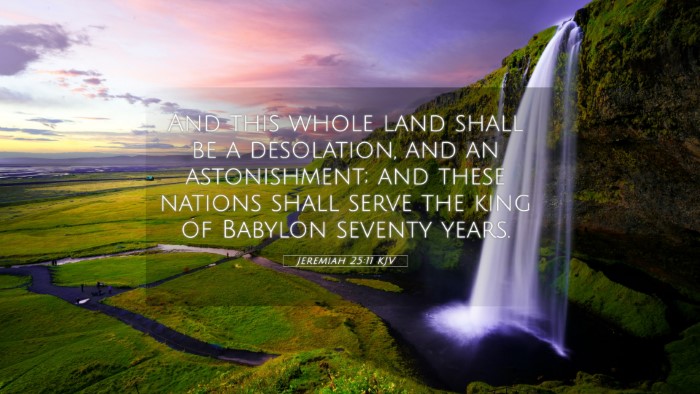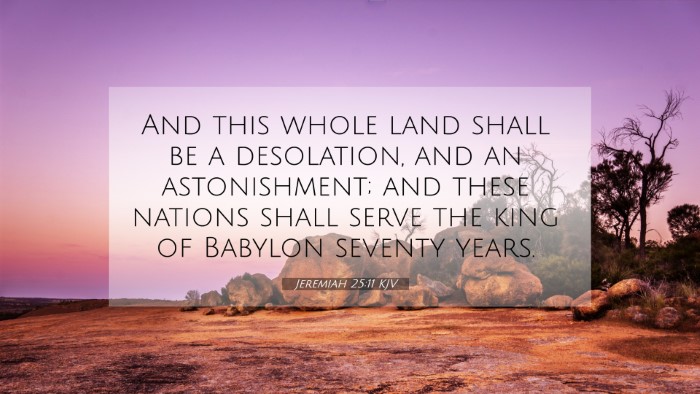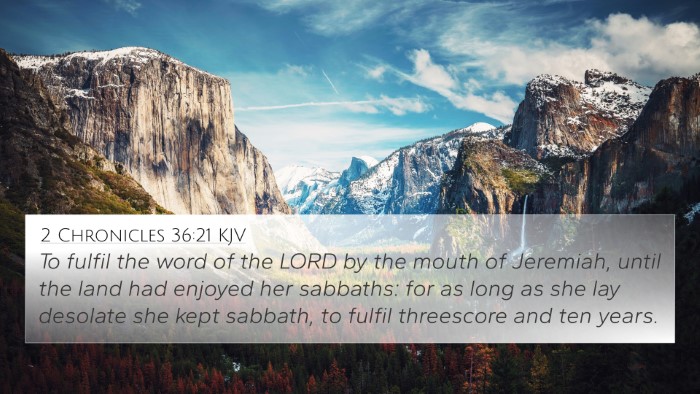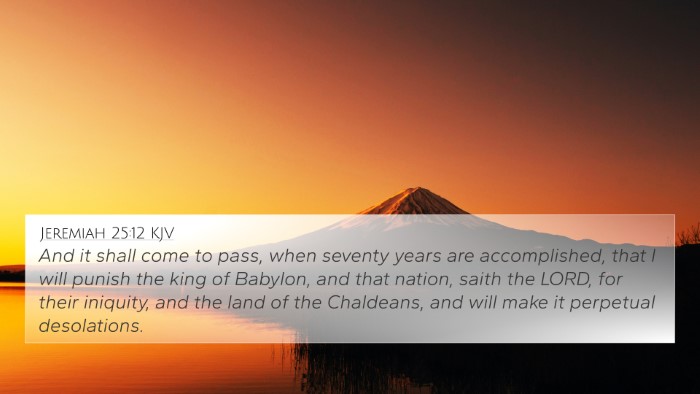Understanding Jeremiah 25:11
Jeremiah 25:11 states: “And this whole land shall be a desolation, and an astonishment; and these nations shall serve the king of Babylon seventy years.” This verse, nestled in the broader context of Jeremiah’s prophetic message, conveys dire consequences for the people of Judah due to their disobedience and idolatry. The significance of this scripture is profound, with layers of meaning that resonate through both historical and theological lenses.
Meaning and Context
This verse is part of God’s message through Jeremiah regarding the Babylonian exile and the judgment that would befall Judah. The desolation described is not merely physical but also spiritual, indicating God's withdrawal of blessing and protection due to the nation's sinfulness. The seventy years serve as a timeframe for exile, a period which was both a means of discipline and a time for eventual restoration.
Insights from Public Domain Commentaries
-
Matthew Henry:
Henry emphasizes that the desolation indicates a total abandonment of the land, which previously had been rich and blessed by God. The seventy years symbolize both a punishment and a purging process, contributing to the need for genuine repentance among the people.
-
Albert Barnes:
Barnes explains that the servitude to Babylon is a reflection of God's sovereignty, demonstrating how divine justice works through secular rulers. He notes that the “astonishment” mentioned points to a shocking reality that would serve to reveal God's majesty and power to both the Israelites and the surrounding nations.
-
Adam Clarke:
Clarke deepens the understanding of the text by indicating that the term “desolation” refers to the complete ruin of Jerusalem and its temple. He connects this with the prophetic vision of the future restoration of Israel post-exile, suggesting a journey that involves trials but ultimately points towards hope.
Bible Verse Cross-References
For a deeper understanding of Jeremiah 25:11, several Bible verses can be cross-referenced, highlighting the connections within the Scriptures regarding judgment, exile, and restoration:
- 2 Chronicles 36:20-21 - Demonstrates the fulfillment of Jeremiah's prophecy concerning the Babylonian captivity.
- Daniel 9:2 - Reflects on the timeline of the seventy years and the anticipation of the restoration.
- Isaiah 39:6-7 - Foretells the Babylonian captivity and the taking of the people into exile.
- Lamentations 1:1 - Expresses the desolation experienced by Jerusalem, echoing Jeremiah's message.
- Ezekiel 12:25 - Confirms that God’s word will come to pass, further solidifying the promise of this judgment.
- Nehemiah 1:3 - Points to the conditions in Jerusalem after the exile, showcasing the reality of desolation.
- Zechariah 1:12 - References God's plan for restoration after the desolation period had completed.
Thematic Connections
This verse serves as a critical link in the narrative of the Old Testament, connecting themes of judgment and redemption:
- Judgment and Accountability: The nations must confront the consequences of their actions, particularly Judah’s fall into idolatry and rebellion against God.
- Divine Sovereignty: Even in discipline, God maintains control over the events of history, demonstrating His ultimate authority.
- Hope of Restoration: The promise of release and return ultimately reminds believers that God's intention is not destruction, but restoration.
Tools for Bible Cross-Referencing
For those studying the Bible and seeking to understand such connections, there are various tools available:
- Bible concordance is invaluable for finding specific verses related to a topic.
- The Bible cross-reference guide can help identify related verses across different books.
- Utilizing a cross-reference Bible study method allows for a richer exploration of themes.
- Comprehensive Bible cross-reference materials consolidate the relationships between various scriptures, aiding in thematic studies.
Inter-Biblical Dialogue
Inter-Biblical dialogue aids in unlocking a holistic understanding of the Bible's messages. By exploring how Jeremiah 25:11 connects with other scriptures, one can better grasp the overarching narrative of sin, judgment, and redemption that runs throughout the biblical text.
Conclusion
In conclusion, Jeremiah 25:11 offers a potent reflection on the consequences of sin and the nature of God's discipline. By examining insights from respected commentaries, cross-referencing with related verses, and understanding broader thematic implications, readers can deepen their theological understanding and embrace the transformative messages of both judgment and hope within Scripture.










